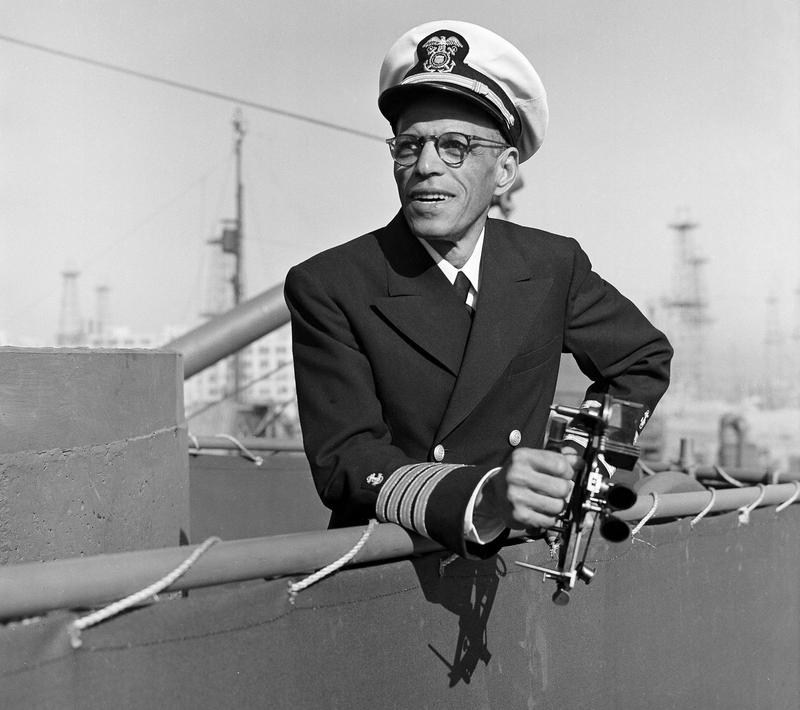Hugh Mulzac: Captain, Victim, Survivor

In this 1943 edition of Great Americans, a program claiming to provide "authentic biographical sketches of outstanding Negroes in the American scene," Captain Hugh Mulzac is profiled…although elevated to sainthood might be more the more appropriate phrase. Mulzac's story is a fascinating one and definitely worth telling, but this ham-handed bit of propaganda sounds more like the output of Radio Moscow than any homegrown product. There are hokey dramatic scenes throughout, charting young Hugh's progress from a cabin boy on British ships to his eventual attaining of American citizenship and qualifying for his Captain's license. Many of these gloss over or flatly contradict the actual incidents of Mulzac's (much more colorful) past. The tone is condescending. Actors often stumble or forget their lines. Yet the facts, even when shoehorned into what increasingly becomes clear is an overt political agenda, are compelling. Mulzac, an African-American, could not get a ship to command, the fear that a white crew would not obey a black man outweighing his obvious qualifications. This came to a head in World War II, when the need for commanding officers became acute. In the radio drama, Mulzac goes to the Maritime Union, where an organizer tells him, "This war's against discrimination. White or black, we're in it together!" The archive's recording of this program then ends abruptly. In fact, the real story of Captain Hugh Mulzac is much more instructive…and not nearly so uplifting.
Mulzac was born in 1886 in the West Indies. He ran away from home at an early age and led an adventurous youth. Eventually, he became an accomplished seaman. As the Maritime Administration website explains:
By 1920, Mulzac passed the examination as a U.S. shipmaster, but there were no shipboard berths available to a black captain. Although he held a master’s license, which qualified him to be a ship’s captain, he worked for the next 20 years mostly in the steward’s department of various shipping lines. This was the only shipboard work he could find, and he became an expert in food service management. With the outbreak of World War II, Mulzac recognized an opportunity to use his license and command a vessel. At age 56, he was named master of the new Liberty ship Booker T. Washington , christened by legendary opera singer Marian Anderson. Mulzac insisted on having an integrated crew, not the all black crew that had been planned. The U.S. Maritime Commission relented, and the Booker T. Washington made 22 round-trip voyages with Mulzac at the helm.
This would seem to be the happy ending the program is heading towards when it breaks off. Alas, it was not to be. Hugh Mulzac was indeed America's first African-American ship master. But the war effort's yoking of patriotic fervor with civil rights proved short-lived. As blackpast.org reports:
When his last assignment on a Liberty ship ended in 1947, now 61-year-old Mulzac was still denied the opportunity to command privately owned commercial vessels. He retired from seafaring and turned to radical politics. In 1950, Mulzac ran on the American Labor Party (ALP) ticket for Queens Borough President. He received only 15,000 votes in his losing bid. With the U.S. in the midst of the Cold War, Mulzac in 1951 was blacklisted by shipping companies because of his affiliation with the controversial ALP which many considered a Communist organization. The U.S. Government also revoked his seaman's papers and license. In 1960, a federal judge reinstated Mulzac's seaman's documents and license and soon afterward at the age of 75 Mulzac found work again as a seaman.
Mulzac's moment in history was brief but intense. His successful command of a mixed crew was a rare attempt to overcome differences of both race and rank in the highly stratified setting of life at sea. The Village Voice quotes one of the sailors who served under Mulzac:
"The Booker T. was the only ship I've ever been on which had a sense of purpose from the top down," Rosenhouse told The Voice. He recalled the classes in seamanship, in art, and in international affairs, as well as the tongue-lashing he'd received when he chose to stand watch on a stormy night inside. "On the bridge we called Mulzac 'captain,' but when he came to union meetings we called him 'brother.' Beefs between the officers and the men could be settled on that ship," Rosenhouse said.
Hugh Mulzac died in 1971.
Audio courtesy of the NYC Municipal Archives WNYC Collection.
WNYC archives id: 5971
Municipal archives id: LT5750
